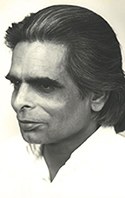To spread the original, universal and eternal truth, path or law of yoga, which remains forever the same in essence, yet always adapts to the time and place. |
ACCORDING TO THE THOMAS GOSPEL
61. Jesus said, "Two will recline on a couch; one will die, one will live." Salome said, "Who are you mister? You have climbed onto my couch and eaten from my table as if you are from someone." Jesus said to her, "I am the one who comes from what is whole. I was granted from the things of my Father." "I am your disciple." "For this reason I say, if one is whole, one will be filled with light, but if one is divided, one will be filled with darkness."
Interpretation :
Of the two entities that we can find upon introspection (when reclining on a couch), the ego is the one who will die (one will die), the self is the one who will always live (one will live). To be whole means to experience the ego as a manifestation of the self, which thus will shine like the self (be filled with light). If one is divided between them, serving now one and then the other, unhappiness will be the result (one will be filled by darkness). Then also the division between me and the rest of the world will remain. That division is absent in the person who is whole, because then the world is also seen as a manifestation of the self and one feels united with everybody.
86. Jesus said, "[Foxes have] their dens and birds have their nests, but the son of man has no place to lay down his head and rest."
Interpretation :
The body or the animal nature can rest in sleep (foxes have their dens and birds have their nests), but the ego (the son), as the false identity of the self (of man), can never rest his mind (lay down his head and rest). As long as the ego is present, peace is not.
87. Jesus said, "How miserable is the body that depends on a body, and how miserable is the soul that depends on these two."
Interpretation :
How unhappy (miserable) is the astral body or feeling body (the body) that depends for its happiness on the physical body (on a body). And how unhappy (miserable) is the causal body (the soul) that depends on both these bodies (these two) for happiness.
112. Jesus said, "Damn the flesh that depends on the soul. Damn the soul that depends on the flesh."
Interpretation :
The body is but a manifestation of the self (the soul). If the self identifies with the body and becomes the ego (the soul that depends on the flesh), it will be unhappy (damned). And if the body or the ego believes that the self will make it immortal (the flesh that depends on the soul), it will likewise be disappointed. The body is expendable, replaceable. The self can only depend on itself. All else is ego.
 This introduction to the Thomas Gospel was written by Peter Marchand, who also wrote these books : "The Yoga of the Nine Emotions" and "The Yoga of Truth". Also browse our yoga video section for online classes by Peter Marchand.
This introduction to the Thomas Gospel was written by Peter Marchand, who also wrote these books : "The Yoga of the Nine Emotions" and "The Yoga of Truth". Also browse our yoga video section for online classes by Peter Marchand.
 Sanatan Society is an international networking association of students of the late Harish Johari, joining efforts to promote his teachings of yoga philosophy, tantra, worship, art and love. Sanatan Society stands
for the original, universal and eternal truth, path or law of yoga.
Though it is Hindu in origin, Sanatan Society is not limited to any religion,
race, time or country, nor in fact to any particular organisation. More about Sanatan Society...
Sanatan Society is an international networking association of students of the late Harish Johari, joining efforts to promote his teachings of yoga philosophy, tantra, worship, art and love. Sanatan Society stands
for the original, universal and eternal truth, path or law of yoga.
Though it is Hindu in origin, Sanatan Society is not limited to any religion,
race, time or country, nor in fact to any particular organisation. More about Sanatan Society...